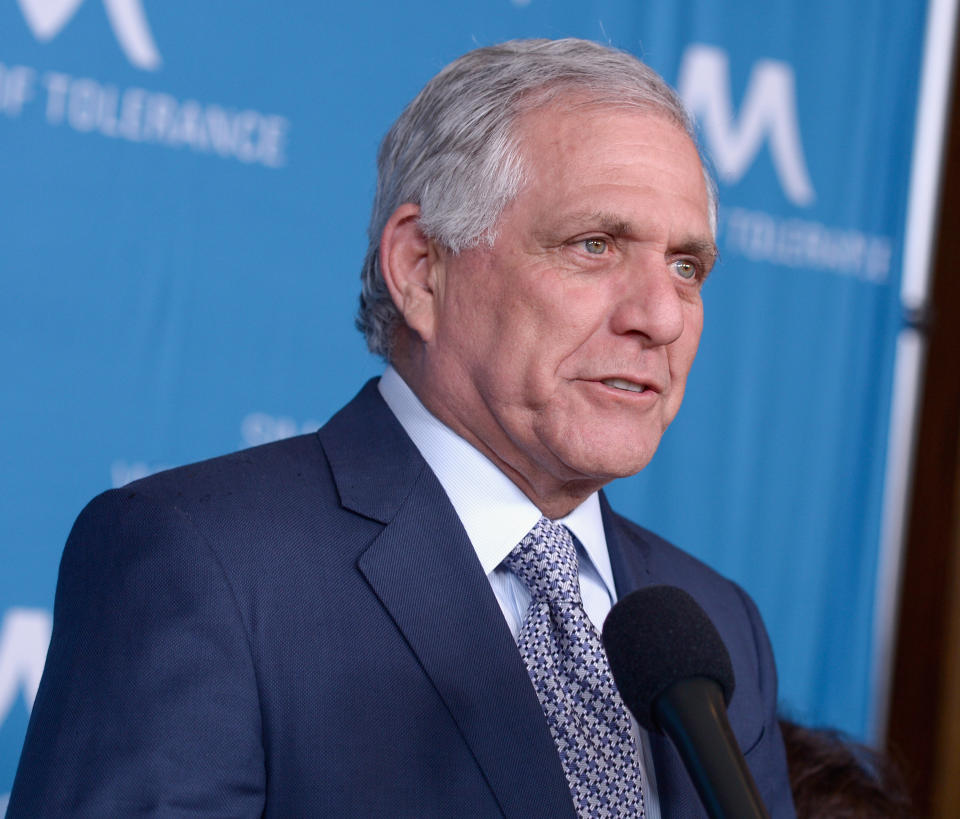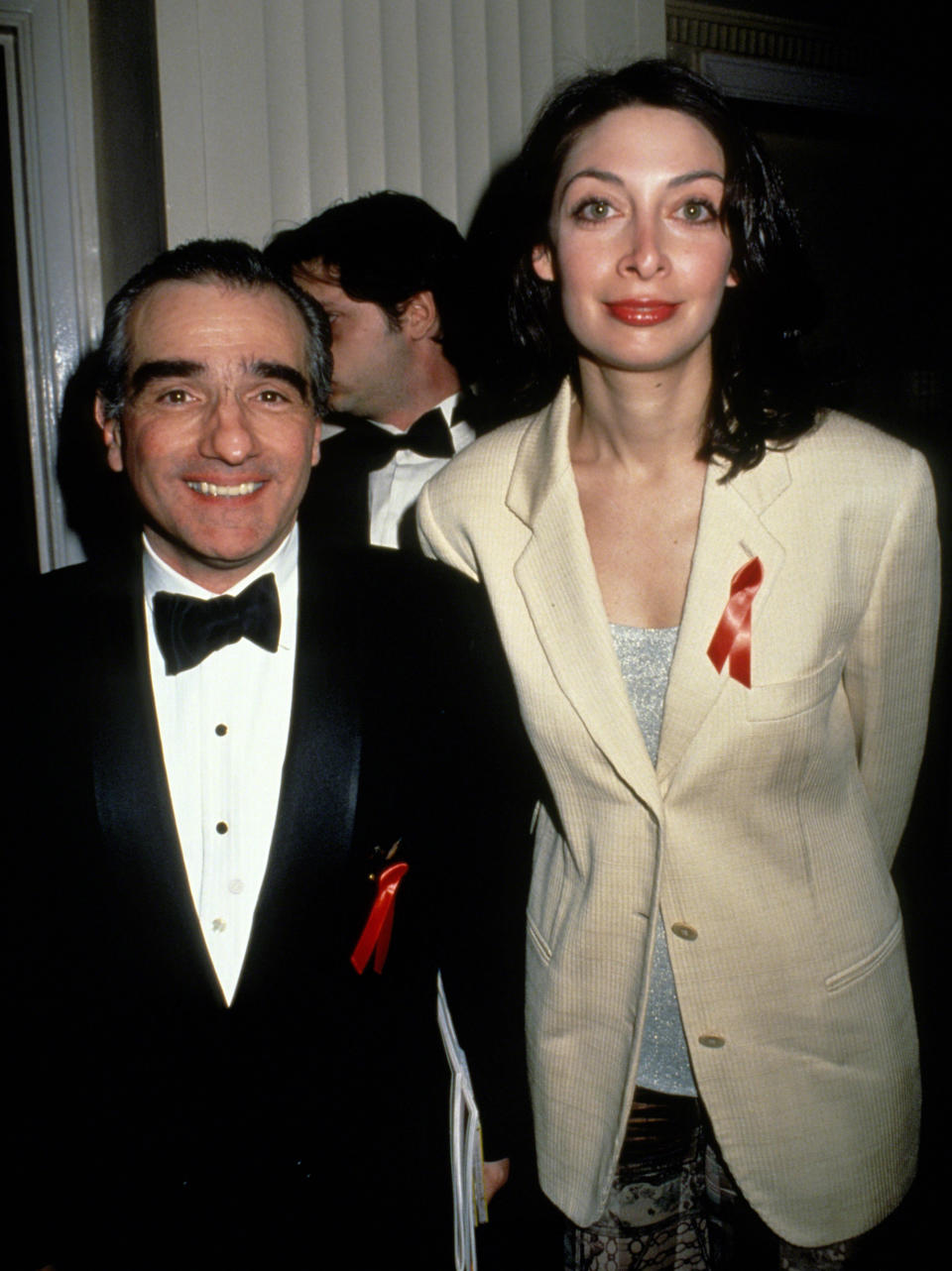Who is Illeana Douglas, the actress who accused CBS executive Les Moonves of sexual misconduct?

Six Feet Under actress Illeana Douglas, along with five other women, is accusing CBS chairman and CEO Les Moonves of sexual misconduct, calling the experience “physically scary.”
The 53-year-old director and actress who dated director Martin Scorsese and starred in films Cape Fear and Goodfellas and the television show Seinfeld spoke to reporter Ronan Farrow for an exposé published Friday in the New Yorker.
In the story, Douglas alleges that the now-68-year-old took a “personal interest” in her when they met in 1996 while she was hunting for television work. “There was the big sell — he was telling me, ‘You’re gonna get a house with a pool, you’re gonna love it, it’s a great life,’” Douglas told the magazine, adding that she landed a role in the comedy Queens, also starring Penelope Ann Miller.
According to Douglas, during a work meeting with Moonves in his office, he asked to kiss her, saying, “It’ll just be between you and me. Come on, you’re not some nubile virgin.” She said that Moonves then grabbed her and then started “violently kissing” her while pinning her down on the couch. “What it feels like to have someone hold you down — you can’t breathe, you can’t move,” she told the magazine. “The physicality of it was horrendous.”
“You sort of black out,” Douglas said. “You think, How long is this going to go on? I was just looking at this nice picture of his family and his kids. I couldn’t get him off me.” At the time, Moonves was married to Nancy Wiesenfeld, with whom he shares three children.
When Moonves pulled up her skirt, fear shook her out of her paralysis and she realized that she needed to try to stop him. “At that point, you’re a trapped animal,” she said. “Your life is flashing before your eyes.”

Douglas says that she managed to escape his grasp but Moonves followed her to the door, blocking her path. “It was physically scary,” Douglas told the New Yorker. “He says, ‘We’re going to keep this between you and me, right?’” She answered, “No, sir, we won’t tell anyone that you’re a good kisser.” He walked away, but, she says, “it has stayed with me the rest of my life, that terror.”
The actress shared that Moonves bullied her on the set of Queens, then called her at home, saying, “You make me f***ing sick. You are not funny,” and fired her from the show. Afterward, Douglas was dropped by her manager and her talent agency, Creative Artists Agency (CAA).
Moonves said in a statement to the New Yorker, “Throughout my time at CBS, we have promoted a culture of respect and opportunity for all employees, and have consistently found success elevating women to top executive positions across our company. I recognize that there were times decades ago when I may have made some women uncomfortable by making advances. Those were mistakes, and I regret them immensely. But I always understood and respected — and abided by the principle — that ‘no’ means ‘no,’ and I have never misused my position to harm or hinder anyone’s career. This is a time when we all are appropriately focused on how we help improve our society, and we at CBS are committed to being part of the solution.”
However, according to the New Yorker, Moonves also admitted, via a statement from CBS, that he tried to kiss Douglas but that “he denies any characterization of ‘sexual assault,’ intimidation, or retaliatory action.”

On Friday, Moonves’s wife and CBS’s The Talk co-host Julie Chen tweeted, “I have known my husband, Leslie Moonves, since the late ’90s, and I have been married to him for almost 14 years. Leslie is a good man and a loving father, devoted husband and inspiring corporate leader. He has always been a kind, decent and moral human being. I fully support my husband and stand behind him and his statement.”
According to the New Yorker, the network issued a statement that reads in part, “CBS is very mindful of all workplace issues and takes each report of misconduct very seriously. We do not believe, however, that the picture of our company created in The New Yorker represents a larger organization that does its best to treat its tens of thousands of employees with dignity and respect.”
While Douglas and Scorsese’s relationship was almost over by the time she was fired, according to the publication, she confided in the director, who was “shocked” by her story and referred her to a law firm but urged her to be cautious about taking legal action.
The power couple began dating in 1988, after then-23-year-old Douglas’s résumé — which listed the skills “great legs and bloodcurdling screams,” caught the director’s eye while making the film The Last Temptation Of Christ. She screamed during an auditioned for Scorsese, “And then Marty said, my God, that’s horrible. How do you do that?” Douglas told NPR in 2015.

Life with the famous filmmaker made Douglas doubt herself. “I mean, that’s the — you know, I always could not, you know, comprehend what Marty saw in me, you know? But we were very — and of course, as I got older I did, but, you know, I didn’t quite see it,” she told NPR. “And so, obviously, I was trying to retain who I was, which, going back to my roots, I really feel, you know, again, I was this rebel. I was this hippie kid and had a lot of, you know, ethics and wanting to make it my own way.”
Douglas went on to say, “The only problem for me was oh, but he’s so much more famous than I am. So for me, being insecure — yes, that was always an issue, you know?”
Their relationship ultimately ended, says Douglas, in part because “I needed to break free and go out on my own and have my own set of circumstances and films.”
In 2015, Douglas published a memoir called I Blame Dennis Hopper that was in part about the influence that the aforementioned actor had on her childhood. When she was a child in 1969, her father (the son of Hollywood actor Melvyn Douglas) became enamored with Hopper’s hippie character in the film Easy Rider and was inspired to launch a commune on the family property in Connecticut.
“My family gave up everything, the white picket fences, the lifestyle, because of the power of a message of a film like ‘Easy Rider.’ It was a time when people saw films and took them to heart,” Douglas told Variety. “We were the children of the Dennis Hopper era. We were kids whose parents wanted to be hippies and live off the land. We were the people who got dirty looks from the bus driver, who looked at us like we lived on a nudist colony. We were outsiders. It’s where I get my rebellious spirit.”
Read more from Yahoo Lifestyle:
Woman says Delta gave her a travel voucher after she was sexually assaulted in midair
Gayle King Calls for ‘Due Process’ in #MeToo Cases: ‘The Man Instantly Gets the Death Penalty’
Follow us on Instagram, Facebook, and Twitter for nonstop inspiration delivered fresh to your feed, every day.
